Add this eBook to your basket to receive access to all 408 records. Our indexes include entries for the spelling dunne. In the period you have requested, we have the following 408 records (displaying 221 to 230): These sample scans are from the original record. You will get scans of the full pages or articles where the surname you searched for has been found. Your web browser may prevent the sample windows from opening; in this case please change your browser settings to allow pop-up windows from this site. Freeholders in county Tyrone
(1873-1875)
Owners of an acre or more, whether resident there or elsewhere: with their addresses; the acreage; and a valuation of the land. The survey commenced in February 1873, the last returns being received in November 1875. | Sample scan, click to enlarge
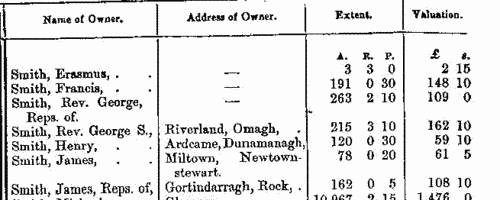
| Freeholders in county Wexford
(1873-1875)
Owners of an acre or more, whether resident there or elsewhere: with their addresses; the acreage; and a valuation of the land. The survey commenced in February 1873, the last returns being received in November 1875. | Sample scan, click to enlarge

| Freeholders in King's County
(1873-1875)
Owners of an acre or more, whether resident there or elsewhere: with their addresses; the acreage; and a valuation of the land. The survey commenced in February 1873, the last returns being received in November 1875. | Sample scan, click to enlarge
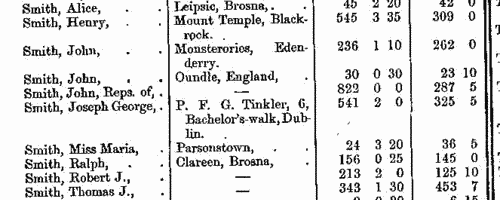
| Freeholders in Queen's County
(1873-1875)
Owners of an acre or more, whether resident there or elsewhere: with their addresses; the acreage; and a valuation of the land. The survey commenced in February 1873, the last returns being received in November 1875. | Sample scan, click to enlarge

| Freeholders in the city of Dublin
(1873-1875)
Owners of an acre or more, whether resident there or elsewhere: with their addresses; the acreage; and a valuation of the land. The survey commenced in February 1873, the last returns being received in November 1875. | Sample scan, click to enlarge

| English Pupil Teachers training to become Schoolmasters
(1876)
The Education Department set examinations for candidates for admission into training colleges, and to become teachers. This is the class list (in order of merit) of the pupil teachers who passed that examination at Christmas 1876. The list gives the candidate's name (surname first) (prefixed by an asterisk where he was examined on second-year papers), and the school in which engaged (N. for National School, Ch. Church of England, B. British School, W. Wesleyan, R. Roman Catholic, P. Parochial, Bd. Board School, Indl. Industrial School). | Sample scan, click to enlarge

| Boys entering Wellington College in Berkshire
(1877)
Wellington College, near Wokingham, was originally founded for the education of sons of military officers. A register of boys entering the school from First Term 1859 to Michaelmas 1933 was compiled by F. G. Lawrence for the Old Wellingtonian Society. In each entry the boy's name is given in full, in bold, surname first; age at entry (usually 11 to 14); then, in brackets, the name of the dormitory or house to which he belonged, in italics, with the years of his stay; then his father's name (usually surname and initials, but not christian name) with military decorations where appropriate. School prefects and captains are noted as such; if the boy played cricket for the school, XI with the years; academic honours, scholarships, &c.; a brief biography; and date of death, or (where known) address in 1933. Year of marriage is given, and sometimes the wife's name and/or her father's name. Clearly, those boys who kept contact with the school and/or had distinguished military careers have detailed entries; others disappeared into oblivion on leaving. | Sample scan, click to enlarge
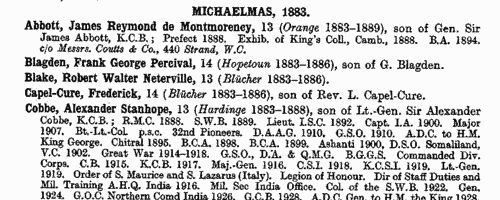
|  Men of the 13th Regiment of Foot (1st Somersetshire - Prince Albert's Light Infantry) fighting in South Africa
(1877-1879) Men of the 13th Regiment of Foot (1st Somersetshire - Prince Albert's Light Infantry) fighting in South Africa
(1877-1879)
What is commonly called the Zulu War Medal was awarded to those British soldiers who fought in a series of conflicts in southern Africa from 1877 (the Kaffir War) through to 1879 (the Zulu War). In 1880 the various units submitted returns of the officers, non-commissioned officers and men 'entitled to the Medal for Military Operations in South Africa during 1877-8-9' and these 'medal rolls' are now in the National Archives. The returns are made with the information arranged in twelve columns:
1. Rank and name
2. Regimental number and rank at the time the medal was earned
3. Whether in possession of medal for previous wars
4. Whether engaged against the Gaikas, Galekas and other Kaffir tribes 1877-8
5. Whether engaged against Pokwane 1878
6. Whether engaged against the Griquas 1878
7. Whether engaged against the Zulus 1879
8. Whether engaged against Sekukuni as set forth in Par. 2. G. O.
9. Whether engaged against Moirosi's stronghold
10. Entitled to medal without clasp under Par. 4.
11. Serving with regiment, depot, dead, discharged, deserted, &c.
12. Notes and cross-references to the Adjutant-General's medal lists.
WO 100/46.
| Sample scan, click to enlarge
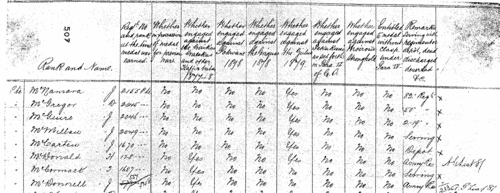
|  Men of the 21st Regiment of Foot (Royal Scots Fusiliers) fighting in South Africa
(1877-1879) Men of the 21st Regiment of Foot (Royal Scots Fusiliers) fighting in South Africa
(1877-1879)
What is commonly called the Zulu War Medal was awarded to those British soldiers who fought in a series of conflicts in southern Africa from 1877 (the Kaffir War) through to 1879 (the Zulu War). In 1880 the various units submitted returns of the officers, non-commissioned officers and men 'entitled to the Medal for Military Operations in South Africa during 1877-8-9' and these 'medal rolls' are now in the National Archives. The returns are made with the information arranged in twelve columns:
1. Rank and name
2. Regimental number and rank at the time the medal was earned
3. Whether in possession of medal for previous wars
4. Whether engaged against the Gaikas, Galekas and other Kaffir tribes 1877-8
5. Whether engaged against Pokwane 1878
6. Whether engaged against the Griquas 1878
7. Whether engaged against the Zulus 1879
8. Whether engaged against Sekukuni as set forth in Par. 2. G. O.
9. Whether engaged against Moirosi's stronghold
10. Entitled to medal without clasp under Par. 4.
11. Serving with regiment, depot, dead, discharged, deserted, &c.
12. Notes and cross-references to the Adjutant-General's medal lists.
WO 100/46.
| Sample scan, click to enlarge
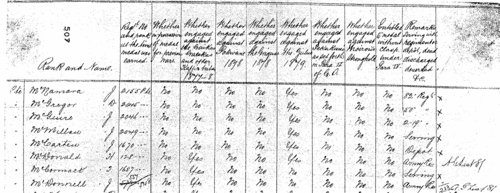
|  Men of the 24th Regiment of Foot (2nd Warwickshire) fighting in South Africa
(1877-1879) Men of the 24th Regiment of Foot (2nd Warwickshire) fighting in South Africa
(1877-1879)
What is commonly called the Zulu War Medal was awarded to those British soldiers who fought in a series of conflicts in southern Africa from 1877 (the Kaffir War) through to 1879 (the Zulu War). In 1880 the various units submitted returns of the officers, non-commissioned officers and men 'entitled to the Medal for Military Operations in South Africa during 1877-8-9' and these 'medal rolls' are now in the National Archives. The returns are made with the information arranged in twelve columns:
1. Rank and name
2. Regimental number and rank at the time the medal was earned
3. Whether in possession of medal for previous wars
4. Whether engaged against the Gaikas, Galekas and other Kaffir tribes 1877-8
5. Whether engaged against Pokwane 1878
6. Whether engaged against the Griquas 1878
7. Whether engaged against the Zulus 1879
8. Whether engaged against Sekukuni as set forth in Par. 2. G. O.
9. Whether engaged against Moirosi's stronghold
10. Entitled to medal without clasp under Par. 4.
11. Serving with regiment, depot, dead, discharged, deserted, &c.
12. Notes and cross-references to the Adjutant-General's medal lists.
WO 100/46.
| Sample scan, click to enlarge
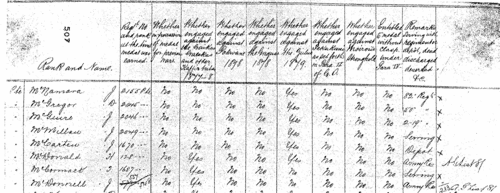
|
Research your ancestry, family history, genealogy and one-name study by direct access to original records and archives indexed by surname.
|












